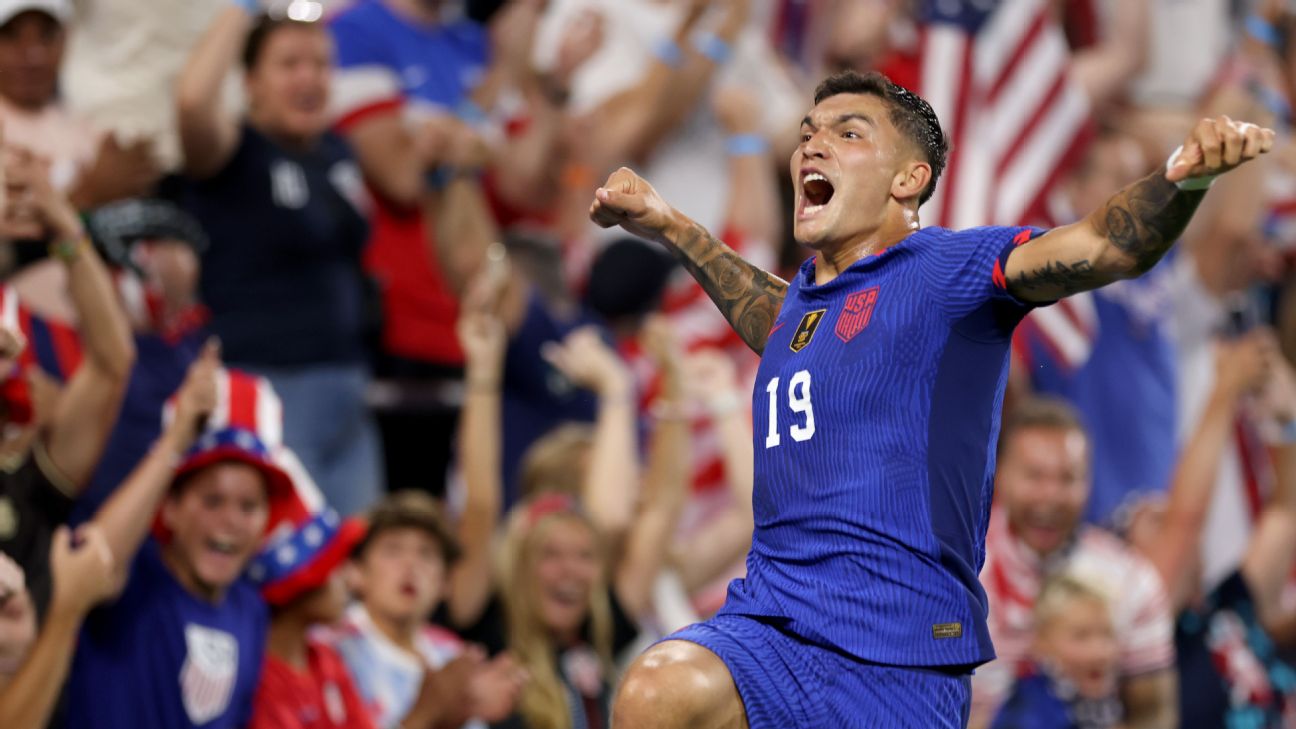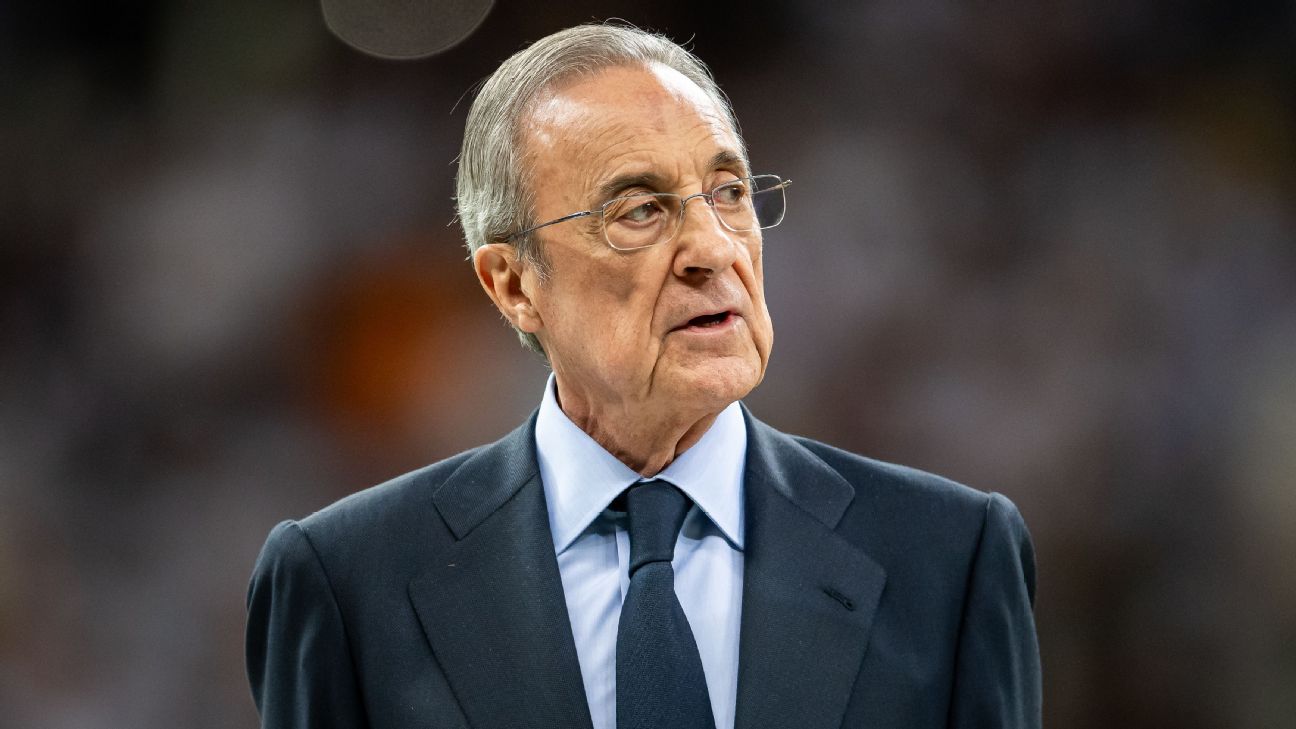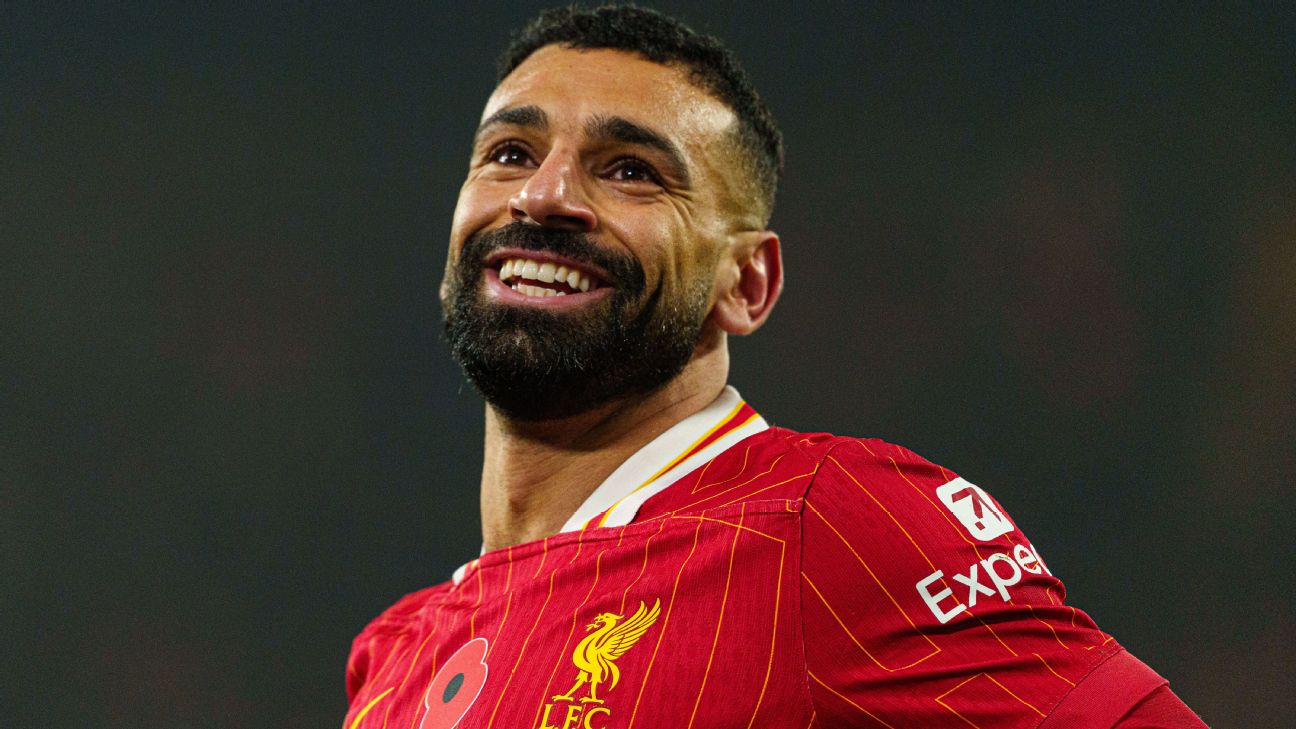CINCINNATI — The United States men’s national team avoided an early Concacaf Gold Cup exit with a penalty shootout win against Canada to advance to the tournament’s semifinal.
After playing to a 2-2 draw through 120 minutes — including a pair of goals in extra time — Jesus Ferreira’s penalty to put the U.S. up 3-2 proved to be the winner after Canada’s fifth kicker, Charles-Andreas Brym, hit to crossbar to end the game.
It was the United States’ second competitive victory against Canada this summer, coming on the heels of its 2-0 win in the Nations League final last month. The Americans will play Panama, which beat Qatar 4-0 on Saturday, in the semifinal Wednesday in San Diego.
The U.S. went up 1-0 in the 88th minute on a goal from FC Cincinnati’s Brandon Vazquez before a Steven Vitoria penalty for Canada in stoppage time evened the game. Canada looked like it had the game won, too, when Canada’s Jacob Shaffelburg scored in the 109th minute, but a Scott Kennedy own goal gifted the U.S. new life.
Rapid reaction
1. USMNT shows a winning mentality in relentless fight
The U.S. was the better team and the deserved victor. But after falling behind in the 109th minute of extra time, it appeared it would fall short of the Gold Cup semifinal for the first time in over two decades.
The fluky own goal that tied it up isn’t exactly a model response, but what the U.S. showed was resilience to keep going.
– Stream on ESPN+: LaLiga, Bundesliga & more (U.S.)
– Read on ESPN+: Why Arsenal bet big on Havertz, Rice
It kept the pressure up, and something good happened. As much as the team’s improved talent has made a difference in the past few years, it has often found a way to find magic late in these Concacaf competitions.
It speaks to the team culture and desire. Those things are hard to measure but when you see it, you can appreciate it — and that was the case Sunday night.
2. Tougher test from Canada reveals USMNT attacking woes
As well as the U.S. played in its past two group games of the Gold Cup, any analysis needs to be prefaced by the gulf in talent between the Americans and their opponents. Against Canada, however, that wasn’t the case.
While neither side in Sunday’s quarterfinal fielded anything close to what resembles a first-choice team, the quality on both sides was similar. And with that being the case, that explosive attack the U.S. showed in St. Louis and Charlotte vanished.
Why? It started on the wings. As has been the case throughout the whole tournament, the wingers were rarely threatening and after scoring back-to-back hat tricks, striker Jesus Ferreira was mostly muted, registering just one shot on goal.
The player who did help his cause with the national team is Brandon Vazquez. After coming on for an 88th-minute equalizer in the first group stage game against a strong Jamaica team, he repeated the feat with another 88th-minute goal to put the U.S. up 1-0. Considering the circumstances of those two goals — who they were against, when they came — it’s reasonable to value them more than what Ferreira accomplished.
3. Concacaf Gold Cup a step backward for Canada
After reaching the World Cup and the Nations League final, almost everything (on the field) has been encouraging about Canada over the past two years or so.
The Gold Cup, however, was a step in the wrong direction. After drawing with lowly Guadeloupe and Guatemala in the group stage, Canada’s lone tournament win came against Cuba, the No. 166th-ranked team in the world.
This poor competition doesn’t really mean much looking forward considering the roster that coach John Herdman named, but it is a reminder that the team’s depth is not among its strengths — at least when measuring it against the better teams in the region. While that’s the overall takeaway, it’s worth pointing out that the Canadians were this close from a win here, which would have overshadowed what has gone wrong.
Best and worst performers
Best: Brandon Vazquez, United States
For the second time in this tournament, Vazquez came off the bench and delivered a meaningful 88th-minute goal.
Best: Steven Vitoria, Canada
Vitoria was solid defensively as Canada limited the U.S. attack and scored the tying goal to send the game to penalties.
Best: DeJuan Jones, United States
The left-back had a strong performance both defending and getting forward.
Worst: Lucas Cavallini, Canada
In the first half, Cavallini had a game-low 12 touches, completed just three passes and received a yellow card that would have kept him out of the semifinal should Canada have advanced.
Worst: Julian Gressel, United States
After playing a team-low 43 minutes in the group stage, Gressel started on the right wing, pushing Alex Zendejas to the opposite flank. The change didn’t pay off, and Gressel’s noted crossing didn’t add anything for the U.S.
Worst: Alejandro Zendejas, United States
One of the few holdovers from the Nations League roster, Zendejas was given every opportunity to make a strong impression in the red, white and blue. He did not. After going scoreless in three group stage starts, he again made very little impact against Canada (1 shot, 0.04 xG).
Highlights and notable moments
In an unusual moment, one of the four officials was injured during the match after taking a ball to the face and had to abandon his duties as a linesman.
We just hope he’s okay. pic.twitter.com/D2b0iIUeWQ
— FOX Soccer (@FOXSoccer) July 10, 2023
Highlights in the first half were limited from there as neither side had a truly good scoring chance.
The USMNT kept pushing, however, and the match got a bit chippy, punctuating the first half whistle with a shoving match.
We’re letting the boys play today 😤 pic.twitter.com/xgdN8hCeVW
— FOX Soccer (@FOXSoccer) July 10, 2023
The second half was relatively devoid of highlights as well — at least up until 88th minute.
Brandon Vazquez got on the end of a dime ball whipped in by DeJuan Jones, putting the Americans ahead.
BRANDON VAZQUEZZZZZZZ 🇺🇸 pic.twitter.com/a1u2P77XVw
— FOX Soccer (@FOXSoccer) July 10, 2023
Canada soon equalized with a penalty kick in stoppage after a handling violation in the box from Miles Robinson. It was at about this point that this match, which had been a slog for almost 90 minutes, really came alive.
Canada’s Jacob Shaffelburg scored a splendid individual goal in the 109th minute.
What a moment and what a way to score your first international goal 🇨🇦@NashvilleSC’s Jacob Shaffelburg reclaims the lead for Canada! pic.twitter.com/DuQWc0GZAg
— FOX Soccer (@FOXSoccer) July 10, 2023
But the U.S. equalized through a Gianluca Busio shot that bounced off Canada’s Scott Kennedy for an own goal.
The late goal forced the match to penalty kicks.
CAN YOU BELIEVE WHAT WE’RE SEEING!? pic.twitter.com/psc5OELkcF
— FOX Soccer (@FOXSoccer) July 10, 2023
After Canada missed three of its shootout attempts, the Americans went through.
On the whole, the match was pretty Concacaf-y.
Key stats (provided by ESPN Stats & Information research)
-
The United States has tied Panama (four) for most wins on penalty kicks in Gold Cup history. The three other wins came in the 1991 final, 2002 semis and 2005 final.
-
The U.S. hasn’t failed to make the Gold Cup semifinals since 2000, when it fell in the quarterfinals.
-
Vázquez’s past three goals for the U.S. have come in the 88th, 90th and 85th minutes of a game — all as a substitute.
-
Jones’ assist to Vázquez traveled more than 37 yards.
Up next
United States: The USMNT advances to the semifinals of the Gold Cup, where it will play Panama on Wednesday.
Canada: With its loss Sunday, Canada has been eliminated from the Gold Cup.



